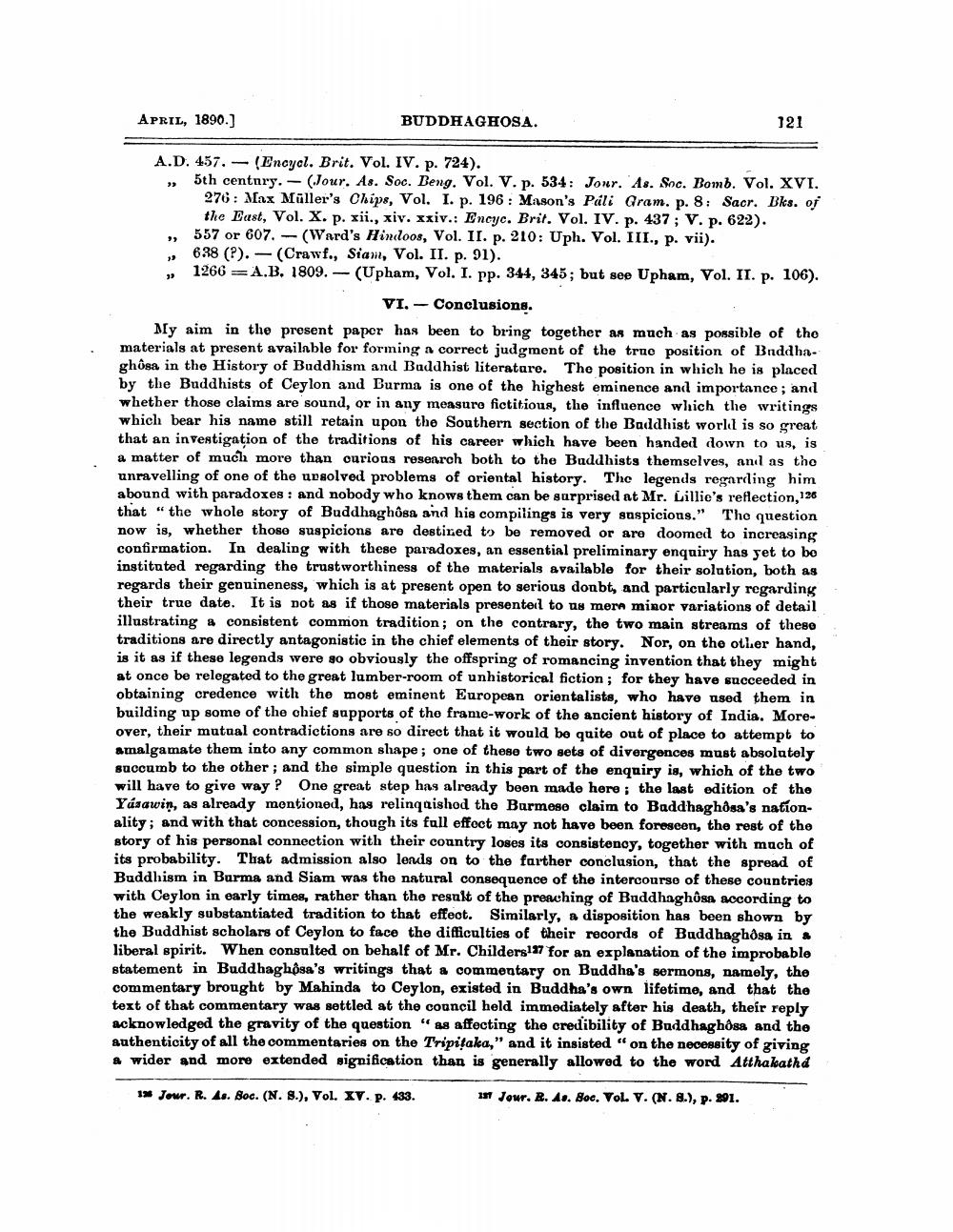________________
APRIL, 1890.)
BUDDHAGHOSA.
121
A.D. 457. - (Encycl. Brit. Vol. IV. p. 724). » 5th centnry. - (Jour. As. Soc. Beng. Vol. V. p. 534: Jour. As. Soc. Bomb. Vol. XVI.
276: Max Müller's Chips, Vol. I. p. 196: Mason's Pali Gram. p. 8: Sacr. Bks. of
the East, Vol. X. p. xii., xiv. xxiv.: Encyc. Brit. Vol. IV. p. 437; V. p. 622). ,, 557 or 607. - (Ward's Hindoos, Vol. II. p. 210: Uph. Vol. III., p. vii). , 638 (?).- (Crawf., Sian, Vol. II. p. 91). , 1266 =A.B. 1809. - (Upham, Vol. I. pp. 344, 345; but see Upham, Vol. II. p. 106).
VI. - Conclusions. My aim in the present paper has been to bring together as much as possible of the materials at present available for forming a correct judgment of the true position of Buddhaghosa in the History of Buddhism and Buddhist literature. The position in which he is placed by the Buddhists of Ceylon and Burma is one of the highest eminence and importance; and whether those claims are sound, or in any measure fictitious, the influence which the writings which bear his name still retain upon the Southern section of the Baddhist worll is so great that an investigation of the traditions of his career which have been handed down to us, is a matter of much more than curious research both to the Buddhists themselves, and as the unravelling of one of the unsolved problems of oriental history. The legends regarding him abound with paradoxes : and nobody who knows them can be surprised at Mr. Lillie's reflection, 126 that “the whole story of Buddhaghôga and his compilings is very suspicions." The question now is, whether those suspicions are destined to be removed or are doomed to increasing confirmation. In dealing with these paradoxes, an essential preliminary enquiry has yet to be instituted regarding the trustworthiness of the materials available for their solution, both as regards their genuineness, which is at present open to serious donbt, and particularly regarding their true date. It is not as if those materials presenteil to us mera minor variations of detail illustrating a consistent common tradition; on the contrary, the two main streams of these traditions are directly antagonistic in the chief elements of their story. Nor, on the other hand, is it as if these legends were so obviously the offspring of romancing invention that they might at once be relegated to the great lumber-room of unhistorical fiction ; for they have succeeded in obtaining credence with the most eminent European orientalists, who have used them in building up some of the chief supports of the frame-work of the ancient history of India. Moreover, their mutual contradictions are so direct that it would be quite out of place to attempt to amalgamate them into any common shape; one of these two sets of divergences must absolutely succumb to the other; and the simple question in this part of the enquiry is, which of the two will have to give way? One great step has already been made here; the last edition of the Yásawin, as already mentioned, has relinqaishod the Burmese claim to Baddhaghôsa's nationality; and with that concession, though its full effect may not have been foreseen, the rest of the story of his personal connection with their country loses its consistency, together with much of its probability. That admission also lends on to the farther conclusion, that the spread of Buddhism in Burma and Siam was the natural consequence of the intercourse of these countries with Ceylon in early times, rather than the result of the preaching of Buddhaghôsa according to the weakly substantiated tradition to that effect. Similarly, a disposition has been shown by the Buddhist scholars of Ceylon to face the difficulties of their records of Buddhaghðsa in liberal spirit. When consulted on behalf of Mr. Childers197 for an explanation of the improbable statement in Buddhaghosa's writings that a commentary on Buddha's sermons, namely, the commentary brought by Mahinda to Ceylon, existed in Buddha's own lifetime, and that the text of that commentary was settled at the council held immediately after his death, their reply acknowledged the gravity of the question was affecting the credibility of Buddhaghôsa and the authenticity of all the commentaries on the Tripitaka," and it insisted “on the necessity of giving & wider and more extended signification than is generally allowed to the word Atthakatha
1
Jour. R. Is. Boc. (N. S.), Vol. XV. p. 133.
111 Jour. R. A. Soc. VOL. V. (N. 8.), p. 991.




